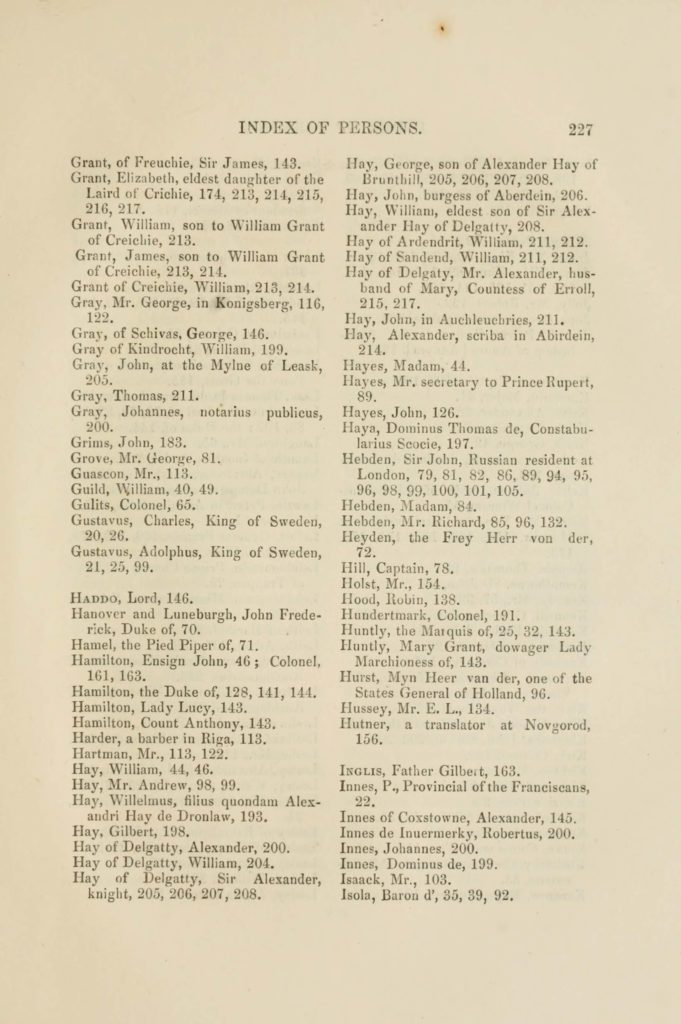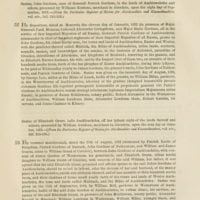
Related

INDEX OF PERSONS. 227 Grant, of Freuchie, Sir James

222 INDEX OF PERSONS. Bockhoven, Colonel von

232 INDEX OF PERSONS. Sinclair, Major

226 INDEX OF PERSONS. Gordon, Mary, daughter of General Patrick Gordon

210 APPENDIX. Instrument of seasing givin to James Gordoune brother german to John Gordoune

224 INDEX OF PERSONS. Ebler, Durick, shipmaster

INDEX OF PERSONS. 229 Lesley, Franciscus Jacobus

APPENDIX. 213 Sasine, John Gordone, sone of Generall Patrick Gordone

228 INDEX OF PERSONS. Ivan, Czar of Muscovy
INDEX OF PERSONS. 227 Grant, of Freuchie, Sir James
Summary
Passages from the diary of General Patrick Gordon of Auchleuchries : A.D. 1635-A.D. 1699"
INDEX OF PERSONS. 227
Grant, of Freuchie, Sir James, 143.
Grant, Elizabeth, eldest daiifi;Iitei' of the
Laird of Crichie, 174, 213, 214, 215,
216, 217.
Grant, Wiiliani, son to William Grant
of Creicl.ie, 213.
Grant, James, son to William Grant
of Creicliie, 213, 214.
Grant of Creicliie, William, 213, 214.
Gray, Mr. George, in Konisrsberg, 116,
122.
Gray, of Schivas, George, 146.
Gray of Kindrocht, William, 199.
Gray, John, at the Mylne of Leask,
205.
Gray, Thomas, 211.
Gray, Johannes, notarius publicus,
200.
Grims, John, 183.
Grove, Mr. George, 81.
Guascon, Mr., 113.
Guild, \\illiam, 40, 49.
Gulits, Colonel, 65.
Gustavus, Charles, King of Sweden,
20, 26.
Gustavus, Adolphus, King of Sweden,
21, 25, 99.
Haddo, Lord, 146.
Hanov(?r and Luneburgb, John Frede-
rick, Duke of, 70.
Hamel, the Pied Piper of, 71.
Hamilton, Ensign John, 46 ; Colonel,
161, 163.
Hamilton, the Duke of, 128, 141, 144.
Hamilton, Lady Lucy, 143.
Hamilton, Count Anthony, 143.
Harder, a barber in Riga, 113.
Hartman, Mr., 113, 122.
Hay, William, 44, 46.
Hay, Mr. Andrew, 98, 99.
Hay, Willelnuis, filius quondam Alex-
andri Hav de Dronlaw, 193.
Hay. Gilbert, 198.
Hay of Delgatty, Alexander, 200.
Hay of Delgatty, William, 204.
Hay of Delgatty, Sir Alexander,
knight, 205, 206, 207, 208.
Hay, George, son of Alexander Hay of
lirunthill, 205, 206, 207, 208.
Ha}', John, burgess of Aberdein, 206.
Hay, William, eldest son of Sir Alex-
ander Hay of Delgaltv, 208.
Hav of Ardendrit, William, 211, 212.
Hay of Sandend, William, 211, 212.
Hay of Delgaty, Mr. Alexander, hus-
band of Mary, Countess of En oil,
215, 217.
Hay, John, in Auchleuchries, 211.
Hay, Alexander, scriba in Abirdein,
214.
Hayes, Madam, 44.
Hayes, Mr. secretary' to Prince Rupert,
89.
Hayes, John, 126.
Haya, Doininus Thomas de, Constabu-
larius Scocie, 197.
Hebden, Sir John, Russian resident at
London, 79, 81, 82, 86, 89, 94, 95,
96, 98, 9.9, 100, 101, 105.
Hebden, iMadam, 84.
Hebden, Mr. Richard, 85, 96, 132.
Heyden, the Frey Herr von der,
72.
Hill, Captain, 78.
Hoist, Mr., 154.
Hood, Rubin, 138.
Hundertmark, Colonel, 191.
Huntly, the Matquis of, 25, 32, 143.
Huntly, Mary Grant, dowager Lady
]\Iarchioness of, 143.
Hurst, Myn Heer van der, one of the
States (General of Holland, 96.
Hussey, Mr. E. L., 134.
Hutner, a translator at Novgorod,
156.
Ikglis, Father Gilbeit, 163.
Innes, P., Provincial of the Franciscans,
22.
Innes of Coxstowne, Alexander, 145.
Innes de Inuermerky, Robertus, 200.
Innes, Johannes, 200.
Innes, Dominus de, 199.
Isaack, Mr., 103.
Isola, Baron d', 35, 39, 92.
Gordon was brought up and remained a lifelong Roman Catholic, at a time when the Church was being persecuted in Scotland. At age of fifteen, he entered the Jesuit college at Braunsberg, East Prussia, then part of Poland. In 1661, after many years experiences as a soldier of fortune, he joined the Russian army under Tsar Aleksei I, and in 1665 was sent on a special mission to England. After his return, he distinguished himself in several wars against the Turks and Tatars in southern Russia. In recognition of his service he was promoted to major-general in 1678, was appointed to the high command at Kiev in 1679, and in 1683 was made lieutenant-general. In 1687 and 1689 he took part in expeditions against the Tatars in the Crimea, being made a full general. Later in 1689, a revolution broke out in Moscow, and with the troops under his command, Gordon virtually decided events in favor of Peter the Great against the Regent, Tsarevna Sophia Alekseyevna. Consequently, he was for the remainder of his life in high favor with the Tsar, who confided to him the command of his capital during his absence from Russia. In 1696, Gordon's design of a "moveable rampart" played a key role in helping the Russians take Azov. One of Gordon's convinced the Tsars to establish the first Roman Catholic church and school in Muscovy, of which he remained the main benefactor and headed the Catholic community in Russia until his death. For his services his second son James, brigadier of the Russian army, was created Count of the Holy Roman Empire in 1701. At the end of his life the Tsar, who had visited Gordon frequently during his illness, was with him when he died, and with his own hands closed his eyes. General Gordon left behind him a uniquely detailed diary of his life and times, written in English. This is preserved in manuscript in the Russian State Military Archive in Moscow. Passages from the Diary of General Patrick Gordon of Auchleuchries (1635–1699) was printed, under the editorship of Joseph Robertson, for the Spalding Club, at Aberdeen, Scotland, 1859.
